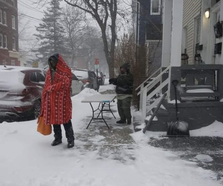 This is both blunt and transparent . . . Luke 18:22, a verse in this Sunday's Sermon text . . . “When Jesus heard this, he said to him, ‘One thing you still lack. Sell all that you have and distribute to the poor, and you will have treasure in heaven; and come, follow me.’” In a few seconds, after the rich ruler walks away “sadly,” Jesus then says: “How difficult it is for those who have wealth to enter the kingdom of God! For it is easier for a camel to go through the eye of a needle than for a rich person to enter the kingdom of God.” There is no doubt this is to be applied rather broadly and not to be rationalize, “Well, this was to one person and God doesn't call every rich person to do this,” for the disciples understood it to apply to all rich people, “then who can be saved then?” Those who typically have the authority to interpret texts like this one are from among those with elevated status in the social structures, i.e., those who rule and have wealth—you can see the conflict of interest here. I do. I feel that conflict myself. I am not exempt from “spiritualizing” or looking for exemptions for this text. We all scramble to exempt ourselves, somehow, from this--no matter the size of our paycheck and bank accounts. Me, too. I have always been rather plagued by this text. But after 40+ years of following Jesus (and this is a “follow Me” text, cf. 18:22d), I wonder if we are so attached to this world—as the Rich Mullins song says, the stuff of earth competes for our allegiance—that we are not free to actually follow Jesus in the way the Gospels teach us? I confess, this week’s sermon text rattles me. And more so because it’s a feast week! Thanksgiving. And it’s cold out. There are homeless surrounding me. And I live amid scarcity.
0 Comments
Wasted Rough Cut: Listening to Jesus' Beatitudes (in Luke) and not robbing the poor of their power.1/16/2022 *The following is a set of sermon prep-notes and ideas for my sermon on Jesus' Beatitudes as Luke presents them in his Gospel. 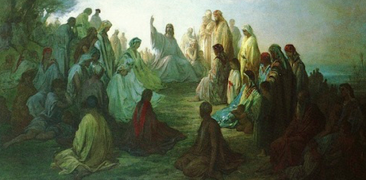 I am amazed, and saddened as well, the lengths Christians, even commentators, will go to read out the “poor” in a vast majority of Bible texts that are so clear and should be necessarily inferred as actual poor. This robs this text in Luke 6 of its gospel-transforming-power, especially with regard to Jesus’ words in the Beatitudes. In Luke 6:20b we read, “Blessed are you who are poor, for yours is the kingdom of God.” (Below I offer my own translation of this verse.) One would think a learned degree is not necessary to hear Luke sets Jesus’ reference to the “poor” in contrast to his equally disturbing reference to the “rich” in what is obviously a paralleled statement in Luke 6:24: “But woe to you who are rich, for you have received your consolation.” In fact, it is much harder to spiritualize Jesus’ reference to the “rich” than it is his reference to the “poor.” This can be seen by the fact hardly anyone does. Luke’s Gospel is filled with such contrasting of the poor and the rich in Jesus’ teachings and in forthcoming parables that we cannot escape something about actual “rich” and actual “poor” is afoot. For example, in Luke 16:20, Jesus compares the poor beggar with the rich man who disregards the beggar only to discover the poor beggar is the one who is blessed in heaven while he was filled (satisfied) on earth: “but now he [the poor beggar] is comforted here [after death], and you [the rich man] are in anguish [after death]” (16:25b). Certainly, given the wider narrative context, there is a link (i.e., a clear and necessary inference) between the “Blessed are . .” and the “But woe to you . . .” contrasted sets in the Luke 6 Beatitudes. This poor/rich contrast is also seen in Luke 21:2, when Luke/Jesus refers to a “poor widow” in contrast to the rich and the pompous pharisees. Later, in Luke 7:22, the proof that Jesus is the messiah and that the kingdom of God had arrived is given by observing what was happening in Jesus’ ministry: “And he answered them, ‘Go and tell John what you have seen and heard: the blind receive their sight, the lame walk, lepers are cleansed, and the deaf hear, the dead are raised up, the poor have good news preached to them.’” Again, in Jesus’ parable of the great feast in Luke 14, the rich are instructed to not invited those who can repay, but invite the poor who cannot repay–again, here is that link to the Luke 6 Beatitudes. (There is also a narrative link to the forthcoming poor beggar/rich man scene in Luke 16 as well.) “But when you give a feast, invite the poor, the crippled, the lame, the blind, and you will be blessed, because they cannot repay you. For you will be repaid at the resurrection of the just” (Luke 14:13). Even when the context and the clear narrative meaning of the text is referencing the actual poor there is a tendency to read out the poor and read in anyone who is “poor of heart.” That certainly keeps the rich satisfied and the poor, well, still poor. This disallows the obvious social/institutional system-contrast Luke has already set up for us in his introduction, that is Mary’s song: he has brought down the mighty from their thrones and exalted those of humble estate; he has filled the hungry with good things, and the rich he has sent away empty (Luke 1:52-53). Thus, restoring the gospel-transforming-power we have robbed from the Beatitudes by reading out the poor from this text.  Luke 6:20b: Μακάριοι οἱ πτωχοί, ὅτι ὑμετέρα ἐστὶν ἡ βασιλεία τοῦ θεοῦ. ESV: “Blessed are you who are poor, for yours is the kingdom of God.” My wooden translation: “Flourishing*, the poor (the marginal and powerless), because allotted to you** is the kingdom of God.” Smoothed out: “Flourishing is the marginal and powerless, because to you—the marginal and powerless—is allotted the Kingdom of God.” I try to pay attention to how early church writers render texts of Scripture. Tertullian (155 AD–220 AD) gave Luke 6:20 and this Beatitude the latin beati mendici—“Blessed are the needy,” or “Blessed are the beggars.” He is not the only one who translated the word πτωχοί as “beggar.” While it (i.e., “πτωχοί,” poor) can and probably does simply mean the “poor” (its detonated meaning), its connotative meaning gives a more powerful nuance. For example: The word we translate “poor,” πτωχοί is vivid: one who crouches (as in shamed to be seen) and cringes (as in cowering in the presence of others), thus it is often used of “beggars.” No doubt it carries the concrete reference to someone who is needy, someone who has no power, someone we typically call “marginal” and powerless in society, and in the ancient world one who would have been called “not-or sub-human.” The two times Luke uses this word associated with a particular person are the beggar named Lazarus (being contrasted with the rich man who had everything and disregarded Lazarus, 16:20) and the poor widow vs. the rich/the duplicitous scribes (21:2)—can’t you see what Luke is doing between the Beatitude promise/affirmations and the wider story in his Gospel narrative? There are more of these throughout the Gospel (see chapter 14 for example). The word we typically render the “poor” (πτωχοί) is better understood by how it is used. While it is certainly can be used metaphorically to mean humble,*** or as a Christian virtue, or still better, more simply, as not-arrogant, there is a reason why this word can be used this way. The word has a concrete meaning range of someone without economic means, who is marginal and powerless–again, this is why the word “beggar” isn’t a stretch and certainly fits Luke’s other uses of the word throughout his Gospel. And, it also fits the extremes of the power/powerlessness contrasts that Luke uses to describe the arrival of Messiah and the teachings/parables Jesus uses throughout Luke’s Gospel: beggar (the least and the most without power) vs. the rich (or the mighty, those who have the resources but do not share with the poor, and/or those who do only to/for those who can pay back). You can see how Luke has shaped his Gospel and why it seems a necessary inference to take “the poor” in the Beatitude as exactly that, the poor as in the marginal and powerless. *”Flourishing” is a far better translation for Μακάριοι than either “blessed” or “happy.” **The “you” is a bigger word than the simple pronoun σύ (you), but as you can see is the word ὑμετέρα, which carries the idea of “allotted to you” or “possessed by you.” Split hairs which nuance, but since this is God’s action or promise I lean toward the nuance of “allotted.” ***In the Greek world, the nuanced meaning of “humble” or as a Christian virtue is a much later connotative meaning given this word, πτωχοί, and should not be read back in to how Luke is using the “poor” / “rich” contrast and comparison. 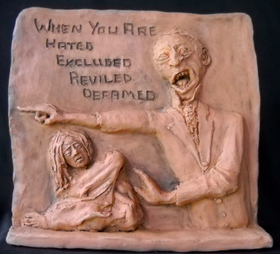 “Blessed are you when people hate you and when they exclude you and revile you and spurn your name as evil, on account of the Son of Man!” (Luke 6:22). While I agree these words are directed at disciples, who will become Jesus’ representatives (probably the meaning behind “on account of the Son of Man,” v. 22e), the description here plays double-duty. Obviously (because we have the whole of the NT to give us fuller understanding) just because one is “poor” or “hungry” or weeping (probably all three is one group), this does not mean they do not need to be born again or qualifies them as automatically born again (something that needs to happen in order for sins to be forgiven, be justified before God, and gain eternal life). Nonetheless, it should be pointed out that “crowd” who came for healing and exorcism would not have been the ones honored nor socially accepted in either the Greco-Roman world nor the Jewish world for that matter. They'd have been the truly marginalized, rejected, and considered sub-human. “. . . a great multitude of people from all Judea and Jerusalem and the seacoast of Tyre and Sidon, who came to hear him and to be healed of their diseases. And those who were troubled with unclean spirits were cured” (Luke 6:17c–18). They would have too easily identified with being hated, being excluded (separated, marginalized, rejected, avoided, ostracize), being reviled, and shunned. The dirty, shameful words trigger: diseased and possessed of unclean spirits. This was their lot, their place in the social castes and institutional systems of the world. The “apostles” that were just chosen (6:13-16), along with the “great crowd of his disciples” (v. 17b), whom the sermon is directed (v. 20), while the larger crowd was listening in—the teaching was very public (and outdoors I might point out!)—they would be as marginalized as the ones who came for healing and who troubled with unclean spirits. Jesus’ appointed representatives (the apostles) and followers (the wider crowd of disciples) would be the poor, the hungry, and those weeping—everything would be turned on its head and the world, its social structure and institutions would hate, marginalize, revile, and spurn those who were truly the blessed, that is the apostles and disciples of Jesus who followed Him and proclaimed this teaching—all on account of being the representatives of the Son of Man, those whom Jesus was reproducing Himself in the world. Yet it would be to them the kingdom belongs, their stomachs would be full (satisfied), and fulled with joy. The appearance of Messiah Jesus and the proclamation of the Gospel—as Jesus’ inaugural sermon indicated (Luke 4:18-19; cf. Isaiah 61:1-2 and 58:6-7)—changes everything about how the systems and structures of this world work (cf. Luke 1:51-53). This is what the beatitudes indicate and mean–and how they should be applied. However, we have traded this all away by making the church (and by that I mean churches and their institutionalized systems) reproduce the world in everything from measures of success to leadership and training to evangelism and (sadly) in our ways of doing and measuring being missional. Discipleship, too often, mimics how the world works rather than what the Beatitudes display.  Lastly, discipleship is not one size fits all. The way Luke has presented Jesus’ Beatitudes is more to expose the structural and systemic, institutionalized empire (Rome-centered, adamic natured) way of defining who is and who is not blessed, who is and who is not honored, who is and who is not fully (or at all) human. What divides humanity. And, addresses the danger of using the world’s way of addressing the issues of poverty and affluence. Take the poor out of Jesus’ reference to the poor and this is lost. This–that is, the Beatitudes are not about “salvation” (that is getting into the Kingdom of God), but about what the new community of God looks like, how it’s system, if you will, works. And this means applying discipleship somewhat (not entirely, but in some specifics) differently to rich disciples and poor disciples. The way to blessing (i.e., kingdom flourishing) is not the way of the world–it is a wholly other way (or as the title of a book I am reading puts it, not the way of the dragon, but the way of the Lamb). Christianity, that is our faith in Christ and our relationship to the church, is not a pathway to success (that is being one of the “rich”). And, our present power granted to us by our place or status in the social structure and current institutions no longer defines us and our neighbors. If one is among the “rich” one best rethink their relationship to the poor and adjust appropriately. Other Sermon on the Plain Wasted Blog thoughts
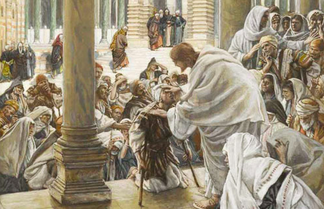 As of January 1, My wife and I live in the Hill, an apartment on Carlisle Street, right next to the Park where we do our summer BBQ ministry. I’m even close enough to walk downtown to meetings and events. One evening, walking back to the apartment from an aldermen’s meeting at town hall, I found myself waiting at a cross-walk when two guys (you can tell, kind of down and out, probably homeless) decided to go, even with traffic coming. One guy had a walker. He walked slow across the intersection, so I headed out with him, telling him, “They’ll have to hit me first.” He smiled and said, “Thanks.” We made it safely, catching up with his friend. They continued to walk slow. I moved on ahead, walking down the block back to my apartment, when I saw a Dunkin Donuts and remembered I had a gift card in my wallet my mom had given me for Christmas. I stopped in to see how much it was for . . . there were no markings . . . $10 the barrister said after scanning it. I went back up the block to my two slow walking friends and said, “Do you guys like coffee?” “Yes,” one of them replied. “I have a gift card for $10—it’s yours.” “Thanks.” They smiled. “Good, we can get a sandwich, too.” I told them: “I can’t take credit for it, my mom gave it to me for a Christmas present.” “Well then, tell your mom, thanks for us.” (I did.) I gave them the card and said, “You’ll see me around. You will see the hat and the ponytail” . . . and, before I could get my name out . . . “Yea, we know. You’re the pastor of the church on Davenport. We know who you are.” How about that? Priceless. Two street, homeless guys, a few blocks from the Hill knew who I was and where our church is. This reminds me that we need to be known . . . and if I get my New Testament correctly, known for the things that indicate the presence of the Kingdom of God. This morning I’d like to bring a messagefrom a thread of passages in the Gospel of Matthew. There is a narrative thread connecting Matthew chapters 4 through 11 that we should listen to, which focuses on Jesus associating with tax collectors and sinners, the poor, the unclean, and the presence of the Kingdom of Heaven. Matthew is asking the readers: How do others know that the Kingdom of Heaven has appeared? To give you the spoiler: Matthew tells us, they can see our association with the poor, marginalized, outcasts, and unclean. This is how they know. I. We are to Follow Jesus around and repeat (what he does):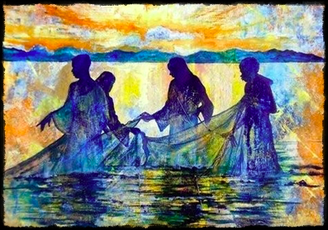 We like to take small bites on the Bible, so sometimes we miss big picture things. And, this is a Big Picture Thing we need to see so we may be better readers of Matthew's Gospel and more faithful followers of Jesus. We begin in Matthew 4:19 where Jesus makes the invitation, “Follow [lit. come after] me and I will make you fishers of men.” The command is to come-after Jesus. That’s the command--follow after me, really follow me around. Most think the command is to be fishers of men—it is not, that’s the promise. We are called to follow Jesus around and he promises to make us fishers of men. By getting the following correct, we become fishers of men. So, what does it mean to follow Jesus around—Matthew tells us. Straight away, just after the call to follow Jesus, Matthew reveals what it was like to follow Jesus around. There is a divine, inspired-ness to what the Gospel writers place into the narrative . . . so right after the scene where Jesus calls us to follow him around, we have . . .
Matthew tells us: we are made fishers of men by following Jesus around—and what did he do?
What we might not realize, however, is Jesus’ first encounter afterHe finishes the Sermon . . . Matthew could have introduced a dozen different encounters, but this is the one He chooses:
This is the Sermon on the Mount realized, illustrated, fulfilled. The Monday after the Sunday Sermon as it were. Now I’m going somewhere with this, so for now remember, following Jesus is actually following Jesus around, learning to do what he did . . . now, we are to repeat . . . *This sermon was preached at Redeemer Presbyterian Church in Concord, MA on Sunday, May 19, 2019. The full sermon maybe downloaded as a PDF (here). An audio version is also be available >> Audio version Part I | Part II | Part III | Part IV
If we turn the “poor in Spirit,” “those who mourn,” and “those who are meek” into “everyone who recognizes they are poor in spirit” and “we all mourn” and “we are all meek before God,” we rob the poor, the mourning, and the meek from the empowering words Jesus spoke. We rob the rich and powerful of the repentance and new vision of the kingdom that Jesus calls them to. We literally have taken the poor out of the “poor” and the mourning away from “those who mourn” and have turned everyone into being meek. We need to hear these beatitudes as if we are a part of that crowd (Matthew 4:23-5:3ff).
With seasonal concerts and church Christmas pageants abounding in our schedules, I think today is a good day to re-post a quote from my daughter, Amanda. Potent stuff to think about as we scurry through the Christmas season with many hours spent watching and listening in our church pews . . . I credit my daughter for thinking more deeply about Christmas even while she was in her teens. She reminded me that most Christians don't see that “the biblical Christmas story begins and ends with death.” The following is from a scratch piece of paper, torn on the edges, penned and handed to me at a Christmas eve service we attended together, now, a few years ago. She was an older teen at the time. And here, she sees a broader view, one that is beyond a warm and cozy Christmas.
Think more deeply about Christmas. (See all posts in this "Think more deeply about Christmas" thread >>
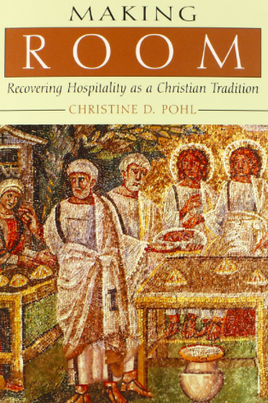 I read books that challenge me, push my convictions, and expose my idolatries. No book, recently, has done this as has Christine Pohl’s Making Room: Recovering Hospitality as a Christian Tradition as I digested page after page. As many who have the patience to read my posts and blogs, I have been rethinking church and its relationship to the poor for some time now. It’s has gotten somewhat more personal as I have been challenged to reevaluate the concept of Christian “hospitality.” Pohl reminds me that biblical hospitality isn’t entertaining friends and family, but the household extending relationships and meeting the needs of the poor and marginal, nearby and traveling through. Typically, most in the church seem to understand hospitality (or the “gift” of hospitality) to be the entertaining or hosting of those we already have some form of relationship (“established bonds”) or shared social status and “significance common ground.” Here, “[h]ospitality builds and reinforces relationships among family, friends, and acquaintances” (13). This kind of hospitality reinforces the shared social status among host and guests, wherein the guests give or affirm something by their presence to the host. Frankly put, this “kind” of hospitality is simply entertaining of guests who affirm or build the host’s social or ecclesiastical status. This is not biblical hospitality. There is commonality, that is the liminal space is shared by hosts and guests before, during, and after the act of hospitality. However, biblical hospitality is more closely related to offering space, comfort, and resources to the stranger, the poor, the marginalized—someone outside or estranged from one’s social status, whereby nothing is gained or affirmed by the hosts. This kind of hospitality, framed by the nature of the gospel itself, is for those disconnected from basic relationships and resources. As Pohl reminds, this “hospitality is central to the meaning of the gospel” (8). Thus, in a real sense,“[h]ospitality is the lens through which we can read and understand much of the gospel, and a practice by which we can welcome Jesus himself” (8). The act of hospitality is a concrete display of the gospel. Prior to hospitality, the host and guests might very well be living out a world that affirms verticality; yet the household becomes a gospel-liminal space that affirms horizontality. This reality—where the gospel is displayed, that is where a leveling of human relationships takes place amid the basic human entity, the household—is an expression of God’s kingdom. Granted biblical hospitality isn’t a mere “how to” for the Christian faith nor should be considered lightly. Yet, I cannot rethink church without considering the Christian tradition of biblical hospitality. It is stretching, convicting, and stressing me to think more deeply. Here is a series of quotes from Making Room that confront me on the issue of being Christian, having resources amid the scarcity of many, and the concept and practice of hospitality. “These hospitality communities embody a decidedly different set of values; their view of possessions and attitudes toward position and work differ from those of the larger culture. They explicitly distance themselves from contemporary emphases on efficiency, measurable results, and bureaucratic organization. Their lives together are intentionally less individualistic, materialistic, and task-driven than most in our society. In allying themselves with needy strangers, they come face-to-face with the limits of a ‘problem-solving’ or a ‘success’ orientation. In situations of severe disability, terminal illness, or overwhelming need, the problem cannot necessarily be ‘solved.’ But practitioners understand the crucial ministry of presence: it may not fix a problem but it solves relationships which open up a new kind of healing and hope” (112). “Recognizing our status as aliens in the world is important for attitudes toward resources and property. Although for most of church history private property was taken for granted, its use among Christians was sometimes moderated by the teaching that everything beyond necessity belonged to the poor. Most of the normative discussions of hospitality assumed that God had loaned property and resources to hosts so they could pass them on to those in need” (114). “In the second-century writing of Hermas we can see an important connection between alien residence and the use of resources. The Similitudes began with the claim that servants of God are living in a ‘strange country,’ far from their true home of heaven. Given their alien status, it makes little sense for believers to collect possessions, fields, or dwellings. Christians live under another law; whatever they have beyond what is sufficient for their needs is for widows, orphans, and other afflicted persons. God gives more than sufficiency for that purpose, not for making believers comfortable and vulnerable to the enticements of a strange land (Sim. 1:1–11)” (115). “If Christians live ‘in a strange land as though in [their] home country,’ they build ‘extraveagent mansions,’ and indulge in ‘countless other luxuries,’ wasting their substance on ‘inanities’ [a nonsensical action, silliness]. Because, when forced to leave the land of their sojourn they will be unable to take their possessions and buildings with them, Christians should instead use their wealth to benefit those in need” (115). Seems that much of our "church" experience affirms our cultural's values regarding social status, continues the horizontal nature of social status quo, and displays the divisions fostered already in society. The way we do church isn't neutral to the issues of poverty, racism, and wealth. Biblical Christian hospitality reverses all of this and helps us to question what we truly believe as Christians concerning our "landed" status as aliens of a different kingdom.
*The second set quotes from my presentation on "Church (local), the poor and their neighborhood" focus on the word "patience." The use of the word sheds light on the problem of allowing the status quo regarding the issues of poverty. It is a nice, maybe even comforting thought, that we need to trust that God will sort out all the justice issues--yet, such an attitude keeps the poor right where they are. Today. Tomorrow. For all the posted "Church (local) quotes >>
*Here are the first set of quotes from a presentation I gave on "Church (local), the poor and their neighborhood," where I sought to ask: "If a local church is “the flesh of a neighborhood” (i.e., the body of Christ local), does this mean a church should be activity concerned about the flourishing of its neighborhood?" This is the first post of a series of quotes (sets of quotes) to provoke our laissez-faire attitutdes and posture toward the issues of poverty and regarding the poor. For all the posted "Church (local) quotes >>
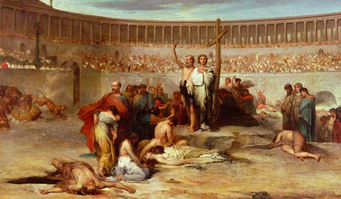 I must make two confessions up front as I began reading through the much treasured, but very often misunderstood John 13 footwashing scene of Jesus and his disciples: First, the eighteen plus years as a planner-grant writer, program developer, and instructor in the social action field, working for agencies that help the poor and low-come, has made me more aware of the Bible’s overwhelming connection to the poor. I most definitely read the Bible differently now. I can see more clearly what I have passed over, spiritualized, and, too often, ignored. I now pick up on nuances in biblical texts and stories that were blurred by my suburban, more privileged up-bringing and how my early Christian years were shaped. I confess am no longer a poor rich reader of the Bible. Second, and with a deep breath, I confess I am burdened and terrified by the call to minister in the Hill community in New Haven, Connecticut. I awake with burdens beyond what I could have imagined as I seek to minister in this broken, yet beautiful community called The Hill. Frankly (and some tell me, don’t let them know how you really feel, don’t show weakness), I am scared to death, sometimes awakening and wondering, “What in the world have I gotten myself and my wife into here?” Scared I’ll mess it up. Frightened that my vulnerabilities will be seen. Afraid my shortcomings, my age, may exhaustion, my weaknesses, and inabilities will be too soon noticed. Yet as Paul heard from God, I too rest in the words, “‘My grace is sufficient for you, for my power is made perfect in weakness.’ Therefore, I will boast all the more gladly of my weaknesses, so that the power of Christ may rest upon me . . . For when I am weak, then I am strong.” So, with humility I approach the text, weak and a common sinner in the hands of an all-too-gracious heavenly Father . . . and you, with so many reasons to listen to others, but with hopes you will hear the text. Let us pray . . . Let’s time travel back to the first few hundred years of church history. Most of us are familiar with the Greco-Roman colosseums and the brutality of the gladiatorial entertainment in the days of the Roman empire. In those colosseums there was a theater of real, unashamed, and intentional death that was designed to displayed the vertical nature of society, of social order, who had status and who did not—and who was and wasn’t a person. Why do I start here? The arena of death and violence is, you must understand, still the experience of so many around the globe today and in most urban centers in the US and in The Hill community—designed by default and intention, in our very built environment—continues to affirm social vertical status and, dare I say, what we affirm as human. Yet, Jesus and the gospel itself point to a leveling . . . displayed in and through and by the church . . . John 13 will paint this picture for us. Religion in the Roman empire was widespread, huge, and multiple. And yet, no one would have imagined that by the early 4th century Christianity would become a major world religion with adherents numbering among the most significance slice of the empire’s population. But the church didn’t start out that way: the first small congregations had no power, no leverage of status, no influence, and certainly no money. So how? As we read through the early church literature and church fathers, one would look in vain for references specifically to “evangelism” as a verbal witness as a matter of the Christian and church life . . . in fact “speaking” would have probably done nothing and no one would have listened (anyway). Literally in the first few hundred years, Christian literature makes no reference to “evangelists” and or even “missionaries.” So, how? Back to the arena games, say around AD 203: The colosseum-amphitheater was a wonder of Roman engineering. Everything about the architecture and the events were to show off the vertical nature of life and social standing in the Empire . . . vertical . . . higher sections . . . seated by wealth and influence . . . how the stands were filled . . . the upper sections were the visual center . . . magistrates, landowners, benefactors, the elite . . . the entertainment of the populace to bolster status and prestige—all affirming the vertical values of society and civil life. All the while, who were in the death-pits, the forced entertainment of death at the bottom of the arena? Of course the gladiators and lions, but it was the bottom of society that faced death—criminals, the unwanted, slaves, the abandoned—all for sport and entertainment. There we also find small bands of Christians . . . but they faced death (face the beasts and gladiators) differently; their presence in the arena subtly subverted the carefully choreographed vertical event. The masses saw husbands (the paterfamilias, head of households), wives, slaves, doctors, former prostitutes, unwanted children standing together . . . expressing publically right there in the arena Christian horizontality. (Yes, that is a word.) When one would fall, the others would help them up to face death standing. They did not defend themselves in any way. Although the whole of the gospel and NT teaching is behind their behavior, but it is the fact that Jesus left a footwashing community and not a militia or even an academy to invade this world IS THE HOW Christianity grew to overtake an empire. Here in John 13 we have a portrait, along with Jesus’s words, a powerful image and reminder of what the Christian community is to look like in the private habits of our worship and out in the public, in Caesar’s arena of death. The cliché is an easy one: Jesus had to leave, but he left a community. The harder thing: John leaves a community of footwashers to show his love to a watching public world: Jesus’ presence in the world is displayed by a mutually loving church that demonstrates the leveling of humanity, the horizontality of God’s love. Our focus is John 13:33–35—and how these verses stand in the midst of the footwashing scene, surrounded by a traitor among them (Judas) and Peter’s brash, impatient display of allegiance. Little children, yet a little while I am with you. You will seek me, and just as I said to the Jews, so now I also say to you, ‘Where I am going you cannot come.’ A new commandment I give to you, that you love one another: just as I have loved you, you also are to love one another. By this all people will know that you are my disciples, if you have love for one another” (John 13:33–35). Everything seems driven by these words from our Lord, here in chapter 13 and all through John 13-17. So we will center on these verses through the footwashing and the outer bookends texts about Judas and Peter in John’s narrative. I. Setting the stage with the footwashing example–Jesus prepares his new community for his departure II. The juxtaposition: The Traitor (Judas) and Brash, Impatient Denier (Peter) III. The power and habits of our text: The Presence of Jesus is the loving-one-another church–the visible, tangible leveling power of the gospel For the full sermon text, please click the download file below . . .
Living Bread Ministries plants indigenous churches among the poorest communities around the globe through a community development model. Join me in helping them accomplish their goals. Join my small fundraiser.
My goal is modest, only $200. But I should have enough friends to multiply my small contribute of $25 to reach the $200. That's only 7 friends giving $25 each. But of course, any gift of any size would be greatly appreciated. Consider deferring ONE Christmas gift to help support church planting among the poorest of us on this planet. Thanks, for considering your part. Chip's Living Bread Fundraiser >>
Living Bread Ministries is leading a comprehensive church planting movement among the global poor. We plant churches among the marginalized, proclaiming the Gospel and making disciples while assisting them to meet the comprehensive needs of their community. Our unique approach combines church planting, humanitarian aid, and development work in the context of an indigenous local church. Please consider donating through my fundraiser >>
|
AuthorChip M. Anderson, advocate for biblical social action; pastor of an urban church plant in the Hill neighborhood of New Haven, CT; husband, father, author, former Greek & NT professor; and, 19 years involved with social action. Archives
February 2024
Categories
All
|
|||||||||||||||||||||||||||||||
Pages |
More Pages |
|


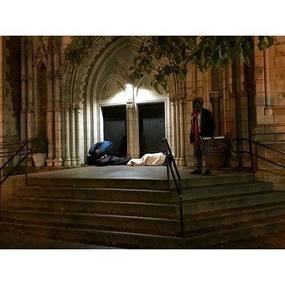
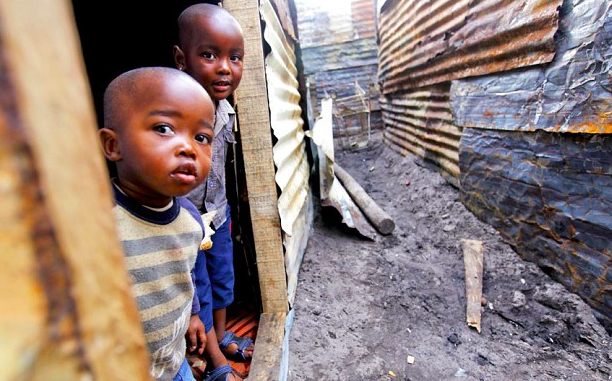
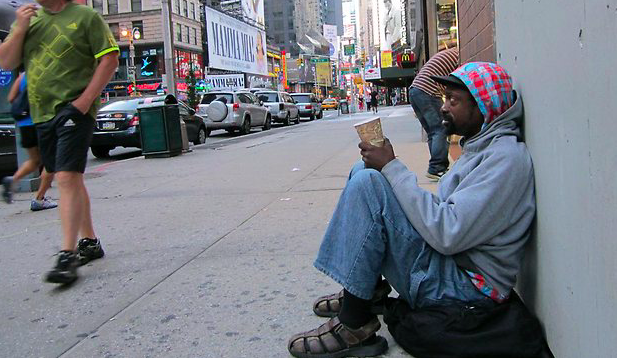
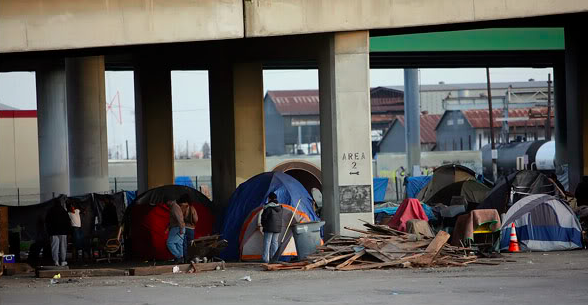
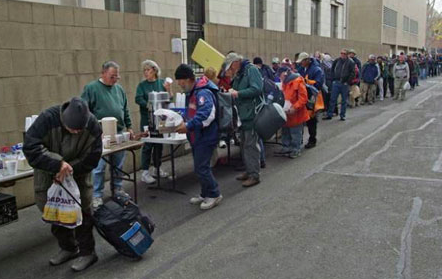
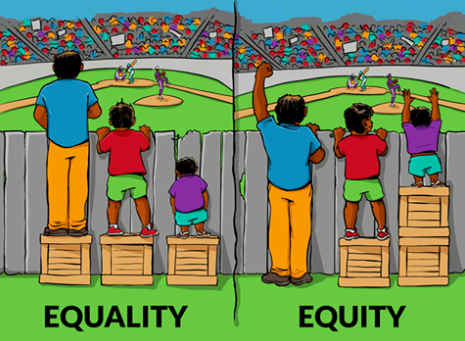
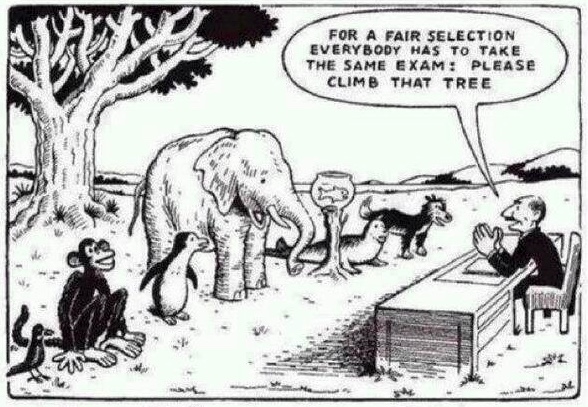


 RSS Feed
RSS Feed